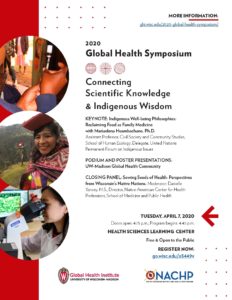With its 16th annual Global Health Symposium, the University of Wisconsin-Madison Global Health Institute invites indigenous scholars and community members to help explore the many ways to advance health across the world. They will join faculty, staff, clinicians and students from the UW-Madison community who will share their global research, education and outreach projects.
“Connecting Scientific Knowledge and Indigenous Wisdom” will explore the intersection of traditional practices that advance well-being and academic research, education and outreach projects that also promote health. It will bring together representatives from Wisconsin’s First Nations, world indigenous communities and the university to showcase the complexities of health challenges and the many kinds of expertise needed to address them. The Native American Center for Health Professions in the School of Medicine and Public Health is co-sponsoring the event.
The 2020 Global Health Symposium program begins at 4:45 p.m., Tuesday, April 7, in the Health Sciences Learning Center atrium and adjoining rooms. It is free and open to the public. Registration is requested.
“The Global Health Institute is excited to bring together indigenous knowledge and western science to address health challenges that threaten people, animals, water, land and the earth,” says GHI Associate Director Lori DiPrete Brown. “Indigenous wisdom and scientific discovery rooted in the academy are two valuable ways of knowing. Considering them together helps us to decolonize knowledge systems and recognize that there are many building blocks to healthy living and well-being.”
 Answers for the future are often deeply rooted in the past and in history, DiPrete Brown says. “At UW-Madison, we’re fortunate to have scholars among us who can help us see the synergies, revitalize our thinking, and envision sustainable well-being for everyone and the earth.”
Answers for the future are often deeply rooted in the past and in history, DiPrete Brown says. “At UW-Madison, we’re fortunate to have scholars among us who can help us see the synergies, revitalize our thinking, and envision sustainable well-being for everyone and the earth.”
Mariaelena Huambachano, Ph.D., M.A., an assistant professor in Civil Society and Community Studies in the School of Human Ecology, will present the keynote address, “Indigenous Well-being Philosophies: Reclaiming Food as Family Medicine.” An indigenous scholar, she is a native of Peru and has strong cultural connections to Aotearoa, New Zealand, where she has lived and worked closely with the Māori of Aotearoa on issues of food sovereignty, sustainability and justice. She is also lead author of the UNESCO Intergovernmental Science-Policy Platform on Biodiversity and Ecosystem Services Values Assessment of Nature and delegate of the United Nations Permanent Forum of Indigenous Peoples’ Issues.
Danielle Yancey, M.S., director of the UW-Madison Native American Center for Health Professions, will moderate the closing panel, “Sowing Seeds of Health: Perspectives from Wisconsin’s Native Nations.” Participants will explore how land use, food security, history and culture impact the health and mental health of indigenous communities.
More than 60 faculty, staff, students and clinicians from the UW-Madison global health and wider community have submitted abstracts for poster and concurrent podium presentations. They cover a wide range of global health topics, including planetary, women’s, children’s and One Health, as well as zoonitic diseases, improving health care and much more. The podium presentations will take place in several breakout rooms, and a poster session follows the panel discussion.